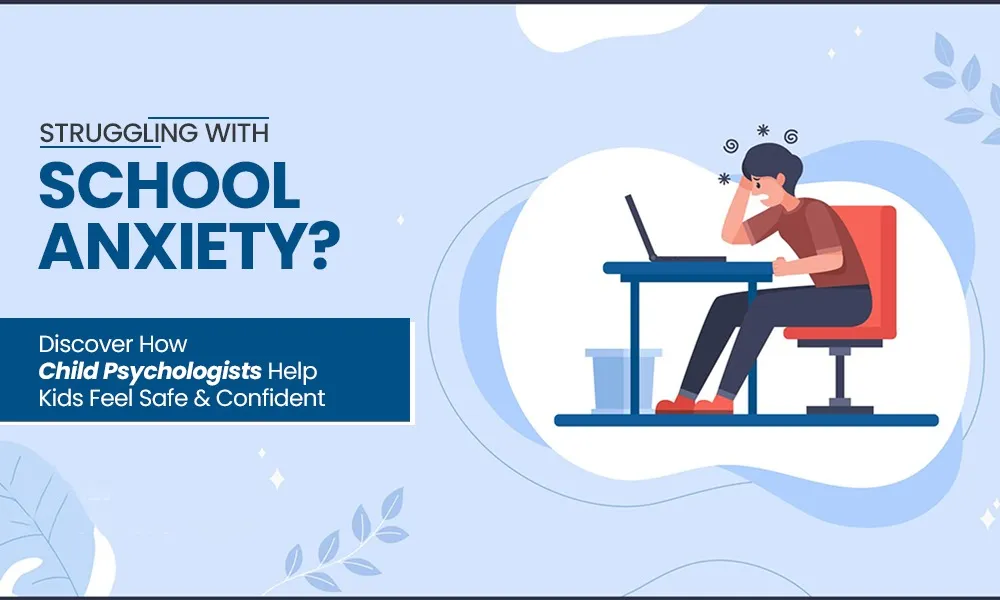How a Child Psychologist Helps with School Refusal or Anxiety

School refusal goes beyond a child simply not wanting to attend class. It is often rooted in childhood anxiety, where going to school triggers overwhelming stress. Studies estimate that approximately 2% to 5% of school-aged children experience significant school refusal related to anxiety disorders.
It is more common in children ages 5 to 6 and 10 to 11 years of age. Kids may complain of stomachaches, headaches or cry excessively before school. When this continues, it affects their learning, friendships and self-confidence.
Signs Parents Should Watch For
School-related anxiety often shows up in subtle ways that parents may overlook. Recognising these early signals can help you step in before the stress starts affecting your child’s emotional well-being and academic growth:
- Frequent morning meltdowns before school
- Avoiding or refusing to complete homework
- Sudden drops in academic performance or grades
- Strong resistance or refusal to leave home for school
- Behaviors driven by anxiety in school-age kids, not defiance
Why Does Anxiety Develop in Children?
Anxiety may stem from separation worries, bullying, academic pressure or social challenges. Every child responds differently, but without child mental health support, these fears can intensify. Approximately 15%–20% of children experience anxiety disorders at some point during childhood. Early identification of these triggers helps parents and professionals build healthier coping strategies.
Role of a Child Psychologist
A child psychologist plays a key role in understanding the emotional and behavioral struggles behind school refusal. Through assessments and conversations, they help uncover the underlying causes of fear. Their expertise ensures that anxiety is addressed with strategies tailored to the child’s specific needs.
Approaches Used in Therapy
One effective method is child therapy for anxiety, which may include relaxation techniques, gradual exposure to school settings and building problem-solving skills. Psychologists also work closely with teachers and parents, creating a supportive environment both at home and in the classroom.
How Therapy Benefits the Child?
Therapy offers children a safe space to express themselves, overcome emotional struggles and build confidence in both academic and personal areas of life. With the right guidance, kids learn healthier ways to cope, connect and grow.
- Builds Emotional Resilience
Therapy helps children understand and manage overwhelming feelings, giving them tools to stay calm and confident in stressful situations.
- Improves School Confidence
With regular sessions, children regain trust in their abilities, leading to better classroom participation and reduced school refusal.
- Reduces Physical Complaints
Anxiety often shows up as headaches, stomachaches, or fatigue. Therapy helps minimise these physical symptoms by addressing the root cause.
- Enhances Social Skills
Children learn how to interact positively with peers and teachers, leading to stronger friendships and healthier classroom dynamics.
- Restores Academic & Personal Balance
By reducing anxiety and boosting confidence, therapy creates a balanced environment where children thrive both in studies and in life.
Parental Involvement in the Process
Parents are guided to respond calmly to their child’s fears rather than reinforcing avoidance. By working alongside the psychologist, families learn communication tools, positive reinforcement techniques and strategies to encourage school attendance without adding pressure.
Building Long-Term Resilience
Addressing school refusal early not only resolves the immediate challenge but also prevents future emotional struggles. Children who receive timely child mental health support often develop stronger coping skills, resilience and adaptability that benefit them well beyond school years.
Support Beyond the Clinic
Psychologists often collaborate with schools to ensure classroom adjustments are made where needed. Small changes like flexible seating, reduced workload during high-stress days or peer support groups can make returning to school less intimidating for the child.
How Mindsy Can Help?
At Mindsy, we make it easier for families to access the right help without leaving home. Through our app, you can connect with experienced child psychologists who specialise in school refusal and childhood anxiety. Our online therapy sessions are flexible, private, and tailored to your child’s needs—so support is always just a tap away. With Mindsy, expert care is available anytime, anywhere, helping your child regain confidence and emotional balance.
FAQ’s
Q1. How do I know if my child needs to see a child psychologist?
If your child shows persistent signs such as frequent meltdowns before school, sudden drop in grades, or refusing to leave home, it may indicate anxiety or a mental disorder. Consulting a child psychologist can help address these issues early.
Q2. Can anxiety in school-age children be considered a mental disorder?
While occasional anxiety is normal, ongoing and intense anxiety can interfere with daily life and may be linked to an underlying mental disorder. A licensed professional can evaluate the severity and guide parents on the right treatment.
Q3. Is it possible to consult an online child psychologist for my child’s anxiety?
Yes, with platforms like Mindsy, you can connect with an online child psychologist from the comfort of your home. This makes therapy accessible, flexible, and less stressful for both parents and children.
Q4. What are the benefits of visiting the best child psychologist in Delhi?
The best child psychologist in Delhi brings expertise in handling school-related stress, anxiety, and behavioral issues. With evidence-based therapies, they provide children with coping tools and help improve overall emotional well-being.
Q5. How can parents support their children alongside therapy with a child psychologist?
Parents can support by creating a safe space at home, maintaining open communication, and reinforcing coping strategies recommended by the child psychologist. Combining professional guidance with parental support often leads to the best outcomes.
Source - https://www.ncbi.nlm.nih.gov/books/NBK534195/ and https://pmc.ncbi.nlm.nih.gov/articles/PMC6524434/
